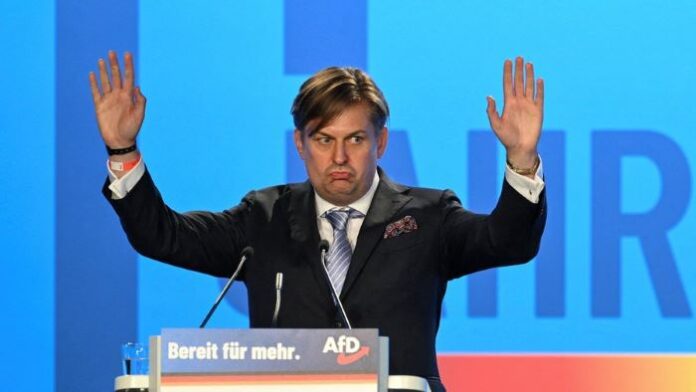Allegations that an aide to a prominent far-right German politician, Maximilian Krah, had been spying for China were “very concerning”, Chancellor Olaf Scholz declared in calling for greater efforts and more urgent actions to uncover such cases.
Attempts to spy on Germany were “unacceptable”, Scholz said, speaking alongside British Prime Minister Rishi Sunak in Berlin.
Spy cases reportedly involving China surfaced in both countries this week, as police in Britain charged two men with spying for China, one reportedly a researcher for a prominent MP in the governing Conservative Party.
In Germany, an aide to a European Parliament member for the far-right Alternative for Germany (AfD) party was arrested on Tuesday. He is accused of passing information about discussions in the European Union legislature to Chinese intelligence and of spying on the Chinese opposition.
The case is a setback for AfD, which had risen to become Germany’s second-most popular party with the approach of this year’s European and local elections.
AfD leaders Alice Weidel and Tino Chrupalla issued a joint statement saying measures were being taken to limit damage to the party. “Any influence by foreign states through espionage, but also attempts to buy opinions and positions, must be investigated and firmly prevented,” they added.
The case has also added to anxieties about Europe being an espionage target for Chinese and Russian operatives. This week, three people were arrested in a separate case in Germany about providing sensitive technology to China for military purposes.
While Scholz he termed the allegations against the AfD “very worrying,” he declined any further comment so as not to prejudice legal proceedings.
On Tuesday, China’s Foreign Ministry spokesperson Wang Wenbin dismissed reports of Chinese espionage in Europe as “hype”, claiming they were “intended to discredit and suppress China”.
In the latest German case, an individual prosecutors identify only as “Jian G.” is accused of passing information about discussions in the EU parliament to Chinese intelligence and spying on the Chinese opposition.
The website of Maximilian Krah, the AfD’s top candidate in June’s European parliamentary elections, lists a Jian Guo as one of his assistants. Krah maintains he learned of the arrest from the media and denies any personal wrongdoing.
Krah cited a need to focus his election campaign on European issues again and to move away “from this very unpleasant matter.” He did acknowledge that it was “a very serious accusation” and indicated that as soon as the arrest warrant was confirmed, he intended to “sack the employee in question”.
Meanwhile, the public prosecutor general’s office in Dresden announced that it had launched preliminary investigations into whether Krah, as a member of the European Parliament, was in receipt of Russian and Chinese payments.
Just last week, Chancellor Scholz was in Beijing for talks with China’s leaders. Berlin wants reassurance that ties with its largest trading partner will not bind Germany to the Chinese economy in a manner similar to the way the invasion of Ukraine exposed Europe’s reliance on Russian gas, making it vulnerable to the cost-of-living crisis that ensued.

